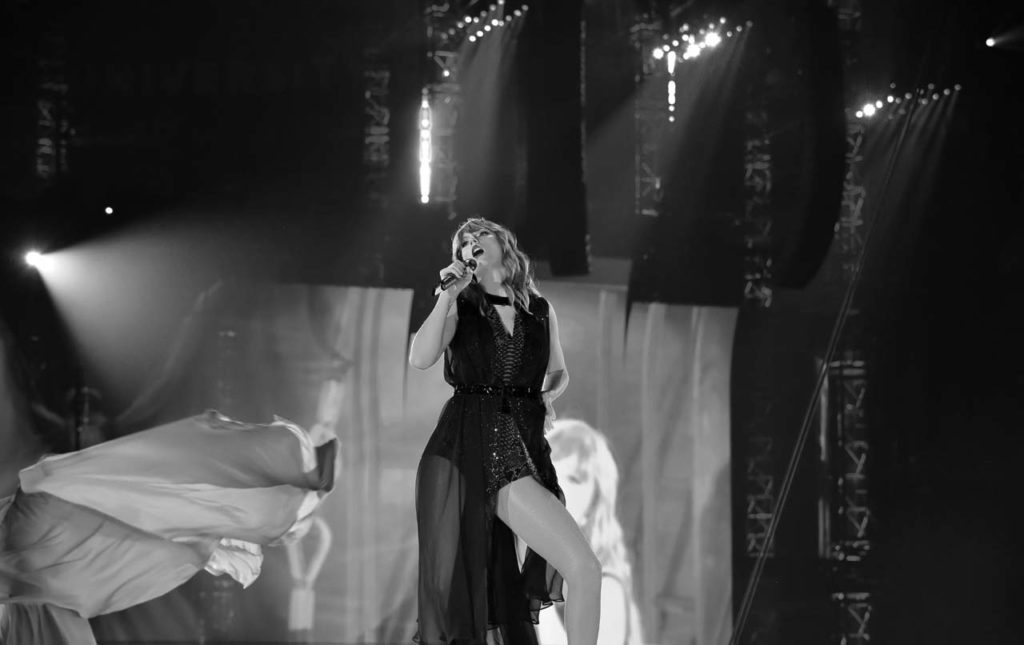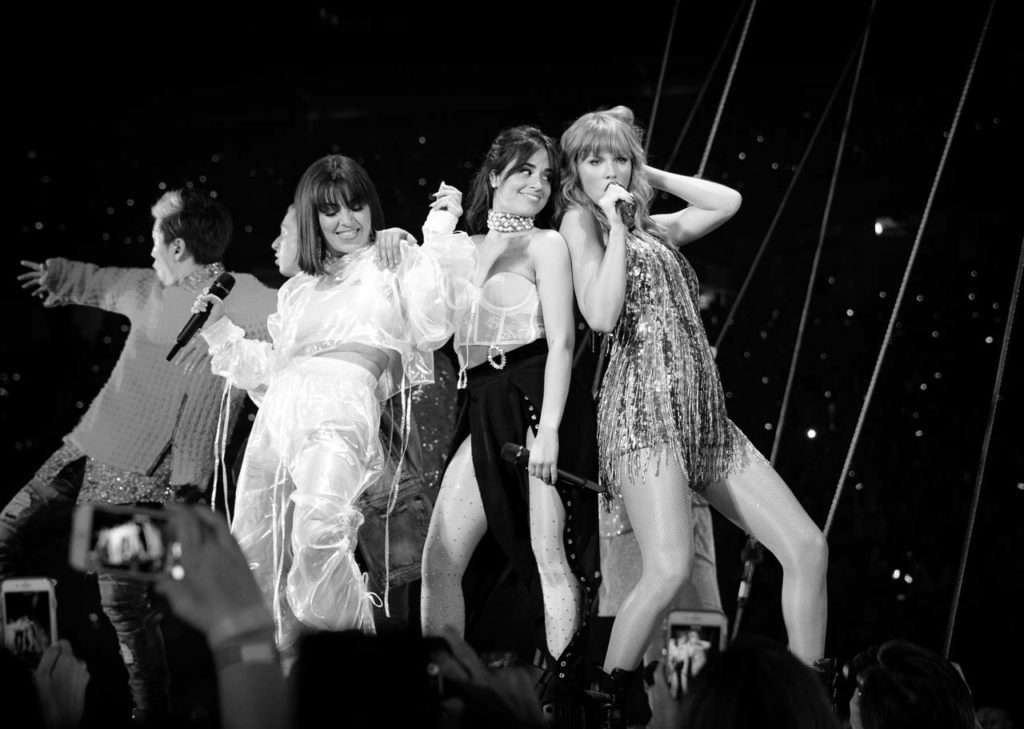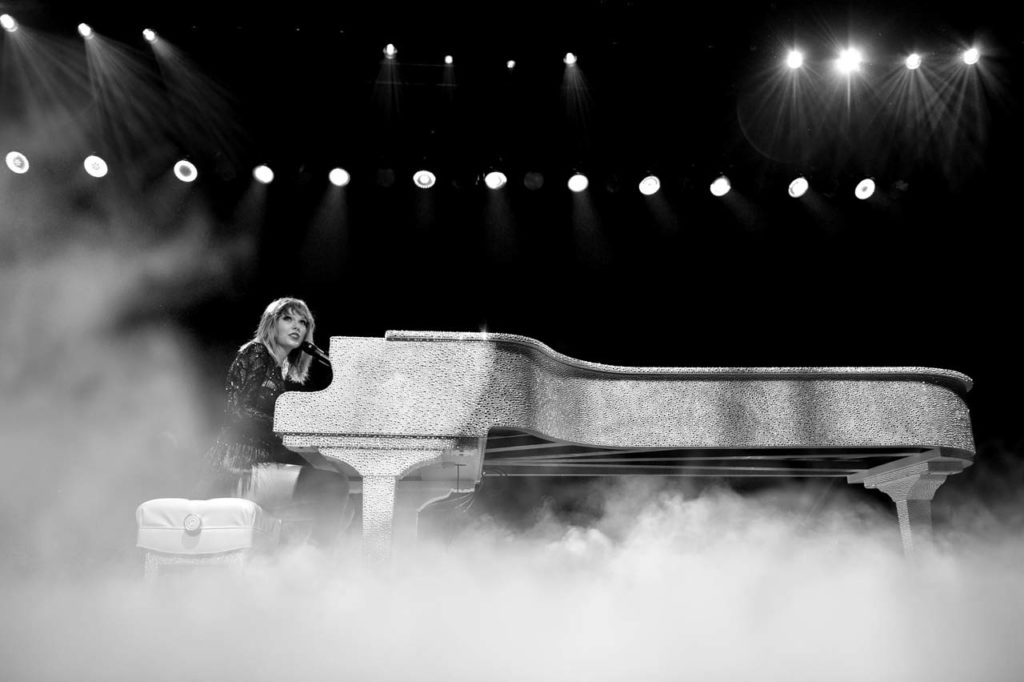AS ONE OF THE BIGGEST POP STARS IN THE WORLD ARRIVES IN JULY FOR NEW JERSEY APPEARANCES, SHE TESTS A REMARKABLE MARKETING CONCEPT: AVOID TRADITIONAL MEDIA AT ALL COSTS AND MAKE FANS NOT JUST A REVENUE SOURCE, BUT HER MUSE AND MIRROR. WE FIND OUT HOW IT’S WORKING
BY JOEL KELLER
It’s not a stretch to say that there are no hidden meanings in Taylor Swift’s songs. No need to pore over the lyrics online, or take to Reddit to decipher what a certain turn of phrase meant.
We may not know who she’s writing about though anyone following her in the tabloids generally has a good idea but we know what: failed relationships, friendships that went south, misperceptions of her in the media, all manner of feuds and slights, and other perils involved with being famous during the era of paparazzi and social media.

But by the time Swift brings her tour in support of Reputation (the album she released in November of last year) to MetLife Stadium for three shows from July 20 to 22, the once famously accommodating and (relatively) open pop star will have been on an eight month media diet.
Right before the album was released, Swift deleted posts from both her Twitter and Instagram accounts, including all the pictures of her “team” of friends that inspired the hashtag “#teamgoals.” She stopped doing interviews. She even made her website a blank space, taking a cue from one of the hit singles from her previous album 1989, released in 2014, .
Since this social media wipeout, her accounts have offered little but anodyne and brief announcements about the album and live gigs. When she does Instagram Stories, they’ll be devoted to topics as benign as showing fans what microphones she’ll be using during the tour. She hasn’t shown up to accept any awards, hasn’t popped up on The View or made the late night circuit. Those lavish profiles of her in Rolling Stone and Vogue, for which a reporter might follow her around as she surprises fans with listening parties and shows her supposed low key life with her cats (named Meredith Grey and Olivia Benson, after two of her favorite TV characters), are a thing of the past.

Give Reputation a good listen, however, then take a look at its corresponding videos released so far, and the reasons for this shunning of the spotlight become clearer. In the video for the album’s first single, “Look What You Made Me Do,” we see her battling not only with past selves (like the guitar toting, innocent teen country singer and the budding superstar who expressed surprise every time she won an award), but also against the people who have wronged her. There are call outs to Kim Kardashian and Kanye West, her past relationship with actor Tom Hiddleston (which was mocked in the tabloids as a publicity stunt), and to another former relationship with Calvin Harris, who criticized her for revealing that she wrote one of his hits under a pseudonym. In the latest confessional offered to fans during a concert (increasingly her sole communication portal) in Glendale, Arizona on May 8, Taylor said, with reference to the long standing feud with West and Kardashian, “A couple of years ago, someone called me a snake on social media and it caught on. And then a lot of people were calling me a liar on social media, and I went through some really low times for a while because of it. I went through some times when I didn’t know if I was going to get to do this anymore.”
“It looks like she has been taking careful notes about every single insult hurled her way and is using her new video to respond par for the course, given her love of vengeance and defending herself against critics,” The Washington Post’s Emily Yahr wrote in November. “She even says as much in the song, as she’s consumed with how to get back at her enemies.”

Lyrics from “Look What You Made Me Do” include:
“The world moves on, another day, another drama, drama/But not for me, not for me, all I think about is karma.”
Another lyric, which Swift has taken to using in the bios of her social media accounts, is also telling:
“The old Taylor can’t come to the phone right now…. Because she’s dead.”

In the video for the single “Delicate,” she’s looking bored and tired on an event red carpet, mobbed by fans and surrounded by security, when she gets a note that sparkles in her hand. At some point, she looks in a mirror and notices her reflection isn’t there. Now invisible, she rips off the skirt from her gown, takes off her heels, and starts dancing through the hotel, a subway then a rainy street, until she’s visible again, soaking wet, in a dive bar. One doesn’t have to dig too deep to understand that the 28 year old may be craving a more private life now that she’s a full-fledged adult.
The lyrics to the latter song have to do with a new relationship that she’s afraid will be cut short due to her past reputation. It’s an allusion to her current beau, British actor Joe Alwyn, and the couple has, remarkably, stayed out of the tabloids for the most part: no shots of the two romping on the beach or walking to get coffee, or anything else for that matter. So, between its lyrics and the relief on her face as she dances in the video, “Delicate” could be a sign of a maturing Swift.
“She casts off the burden of her name and face, and dances for the pure joy of music the reason she began writing songs in the first place,” wrote Billboard’s Richard S. He. “Her message: We are not defined by our lowest moments. We are how we choose to define ourselves, and Taylor chooses to humble herself through awkward, honest, cathartic dance. ‘Delicate’ finally allows her to hit reset.”

It also feels like the Pennsylvania native (whose family moved to Hendersonville, Tennessee when she was 14 so Swift could pursue a Nashville based music career) has scaled back as a way to reserve resources for the grind of touring after a rough 2017. The last major interview she did was in a December Time magazine issue, after it named her as one of the “Slience Breakers” of the #MeToo movement part of a collective “Person of the Year.” Her early membership in those ranks stems from a 2013 incident in which Swift reported to Denver, Colorado radio DJ David Mueller’s bosses that he grabbed her inappropriately during a concert meet and greet. She, in turn, was sued by Mueller (who was fired over the incident), and her frank, non deferential testimony on the stand contributed to her winning the case.

“I think that this moment is important for awareness, for how parents are talking to their children, and how victims are processing their trauma, whether it be new or old,” she wrote in the Time interview. “The brave women and men who have come forward this year have all moved the needle in terms of letting people know that this abuse of power shouldn’t be tolerated.” She called the lawsuit “a lonely and draining” experience.
Can an artist, even one of Swift’s considerable star power, thrive despite a media brownout? So far it seems she’s been able to do just that: Reputation has surpassed two million units sold, and the tour is expected to gross nearly $300 million. However, there are signs that Swift going underground has had an effect: the album opened big, but was her slowest to two million since early days, and first announced concerts did not sell out instantaneously, as they had in the past. While these may not be signs of a star in decline, they are an indication that Swift’s market veneer isn’t as white hot as it once was.
That said, we can count on the fingers of one hand music stars who can lay low in this way, insist upon putting out an album that’s more personal and less frothy than past releases, turn her social media into a frankly drab promotional vehicle, and still have a massive hit album and tour. While her detractors may not forget about her past attempts at promotion, songs about her exes, and every other criticism, fans know that she’ll give them a great performance. And to Swift, that’s all that matters right now.


